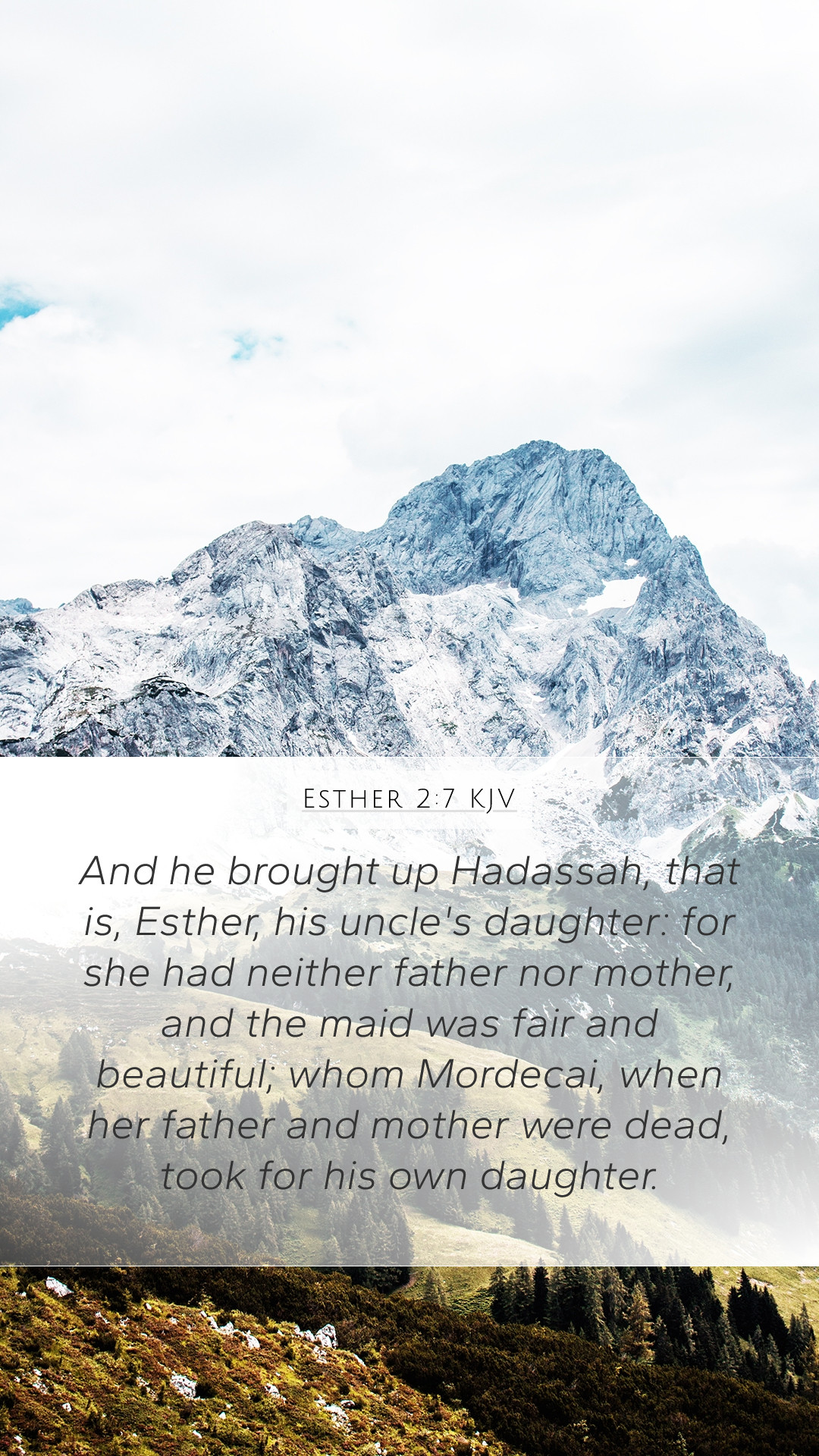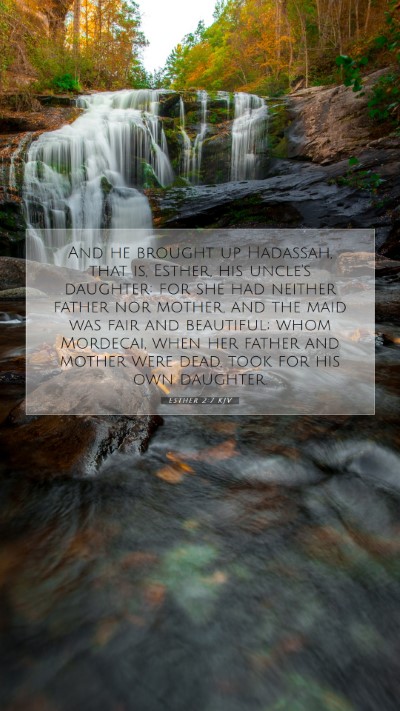Old Testament
Genesis Exodus Leviticus Numbers Deuteronomy Joshua Judges Ruth 1 Samuel 2 Samuel 1 Kings 2 Kings 1 Chronicles 2 Chronicles Ezra Nehemiah Esther Job Psalms Proverbs Ecclesiastes Song of Solomon Isaiah Jeremiah Lamentations Ezekiel Daniel Hosea Joel Amos Obadiah Jonah Micah Nahum Habakkuk Zephaniah Haggai Zechariah MalachiEsther 2:7 Meaning
What is the meaning of Esther 2:7?
And he brought up Hadassah, that is, Esther, his uncle's daughter: for she had neither father nor mother, and the maid was fair and beautiful; whom Mordecai, when her father and mother were dead, took for his own daughter.
Esther 2:7 Bible Verse Meaning
Understanding Esther 2:7 - Bible Verse Commentary
Esther 2:7 states, "And he brought up Hadassah, that is, Esther, his uncle's daughter: for she had neither father nor mother, and the maid was fair and beautiful; whom Mordecai, when her father and mother were dead, took for his own daughter." This verse introduces us to Esther, a key figure in the Book of Esther, and highlights her origins and the important role of her cousin Mordecai. The meaning of this verse can be explored through various interpretations that reflect its significance in both historical and spiritual contexts.
Bible Verse Meanings and Interpretations
-
Contextual Background:
Understanding Scripture is crucial for grasping the historical background of Esther. The events take place during the Babylonian exile, wherein the Jewish people's lives were deeply affected by their captivity and diaspora. Esther, being orphaned, reflects the plight of many Jewish people who faced hardships during this period.
-
Mordecai's Role:
Mordecai's action of adopting Esther speaks volumes about familial duty and compassion. According to Matthew Henry, this showcases the virtues of care and responsibility within family structures. Here, Esther’s beauty is not merely physical but symbolizes her inner strength that will emerge in later chapters.
-
Esther's Significance:
The mention of Esther’s beauty is not trivial. Albert Barnes notes that this physical description foreshadows her pivotal role in the king’s selection process and her eventual rise to power. It also illustrates God's providential hand in raising Esther for "such a time as this" (Esther 4:14).
-
Theological Insights:
Adam Clarke emphasizes that Esther’s dual identity—as a Jew and a Persian queen—demonstrates God’s plan of salvation, often working through unlikely means. Esther’s situation encourages readers to reflect on divine purpose in their lives.
Applying Esther 2:7 to Daily Life
This verse encourages believers to reflect on their stewardship over others, especially those placed under their care. It teaches us about the importance of community and familial bonds in nurturing ones’ potential. The narrative invites individuals to be mindful of their roles and responsibilities, especially toward vulnerable people like orphans and the distressed.
In-Depth Bible Verse Analysis
Analyzing Esther 2:7 through the lens of Scripture analysis reveals layers of meaning in how we connect with others. Biblical exegesis of this verse encourages readers to identify with Esther’s journey from an orphaned child to a courageous queen and advocate for her people. This transformation can inspire discussions in Bible study groups about identity, belonging, and the roles we can play to impact those around us.
Related Biblical Cross References
- Esther 4:14: Esther's readiness to take action reflects her heritage and God's purpose for her life.
- Psalm 27:10: "When my father and my mother forsake me, then the Lord will take me up," showing God’s care for the orphans.
- Proverbs 3:5-6: Encouraging trust in God’s plan, relevant to Esther’s story.
Conclusion
Esther 2:7 highlights themes of adoption, identity, and divine providence. The verse provides a platform for Bible study insights, urging exploration into how we can support one another in our own communities. By understanding Scripture in a holistic manner, we gain deeper insights into our own lives and responsibilities, leading to richer discussion in Bible study lessons and greater application of biblical teachings in our daily lives.


